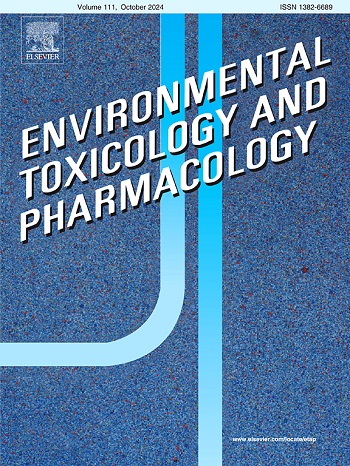被三效杀真菌剂污染的花粉会诱发氧化应激并降低蜜蜂的寿命,但对喂养良好蜂群的蜜蜂寿命影响较小。
IF 4.2
3区 环境科学与生态学
Q2 ENVIRONMENTAL SCIENCES
引用次数: 0
摘要
实验旨在确定三效杀真菌剂对蜜蜂的影响,以及改善营养是否能减轻最终的负面影响。在笼养试验中,用喷洒过或未喷洒过含有噻螨酮、丙硫菌唑和三唑酮的商用杀真菌剂的向日葵花粉喂养来自喂养良好和营养受限蜂群的新雏蜂五天。喂养充足的蜂群中的蜜蜂体型明显更大,消耗的无污染花粉也更多。它们还表现出谷胱甘肽过氧化物酶活性增强,吡啶核苷酸浓度升高,这两种物质都参与了抗氧化防御。然而,无论营养状况如何,受杀菌剂污染的花粉都会导致脂肪过氧化反应增加。花粉食物中的杀真菌剂污染和不良的营养状况都会缩短蜜蜂的寿命。用受污染的花粉喂养蜜蜂会受到杀真菌剂的不利影响,但对饲养蜜蜂的蜂群进行营养补充可部分弥补这些影响。本文章由计算机程序翻译,如有差异,请以英文原文为准。
Pollen contaminated with a triple-action fungicide induced oxidative stress and reduced longevity though with less impact on lifespan in honey bees from well fed colonies
Experiments were conducted to determine the effects of a triple-action fungicide on bees and whether improved nutrition can ameliorate eventual negative impacts. In cage tests, newly-emerged bees from well fed and from nutritionally-restricted honey bee colonies were fed for five days with pollen from sunflowers that had been sprayed or not with a commercial fungicide containing bixafen, prothioconazole and trifloxystrobin. Bees from well-fed colonies were significantly larger and consumed more uncontaminated pollen. They also exhibited increased glutathione peroxidase activity and higher concentrations of pyridine nucleotides, both of which are involved in antioxidase defense. However, pollen contaminated with fungicide led to an increase in lipoperoxidation, regardless of nutritional status. Bee longevity was reduced by both fungicide contamination of the pollen diet and poor nutritional condition. The fungicide adversely affected bees fed with contaminated pollen, though nutritional supplementation of the bee colonies that reared the bees partially compensated for these effects.
求助全文
通过发布文献求助,成功后即可免费获取论文全文。
去求助
来源期刊
CiteScore
7.00
自引率
4.70%
发文量
185
审稿时长
34 days
期刊介绍:
Environmental Toxicology and Pharmacology publishes the results of studies concerning toxic and pharmacological effects of (human and veterinary) drugs and of environmental contaminants in animals and man.
Areas of special interest are: molecular mechanisms of toxicity, biotransformation and toxicokinetics (including toxicokinetic modelling), molecular, biochemical and physiological mechanisms explaining differences in sensitivity between species and individuals, the characterisation of pathophysiological models and mechanisms involved in the development of effects and the identification of biological markers that can be used to study exposure and effects in man and animals.
In addition to full length papers, short communications, full-length reviews and mini-reviews, Environmental Toxicology and Pharmacology will publish in depth assessments of special problem areas. The latter publications may exceed the length of a full length paper three to fourfold. A basic requirement is that the assessments are made under the auspices of international groups of leading experts in the fields concerned. The information examined may either consist of data that were already published, or of new data that were obtained within the framework of collaborative research programmes. Provision is also made for the acceptance of minireviews on (classes of) compounds, toxicities or mechanisms, debating recent advances in rapidly developing fields that fall within the scope of the journal.

 求助内容:
求助内容: 应助结果提醒方式:
应助结果提醒方式:


